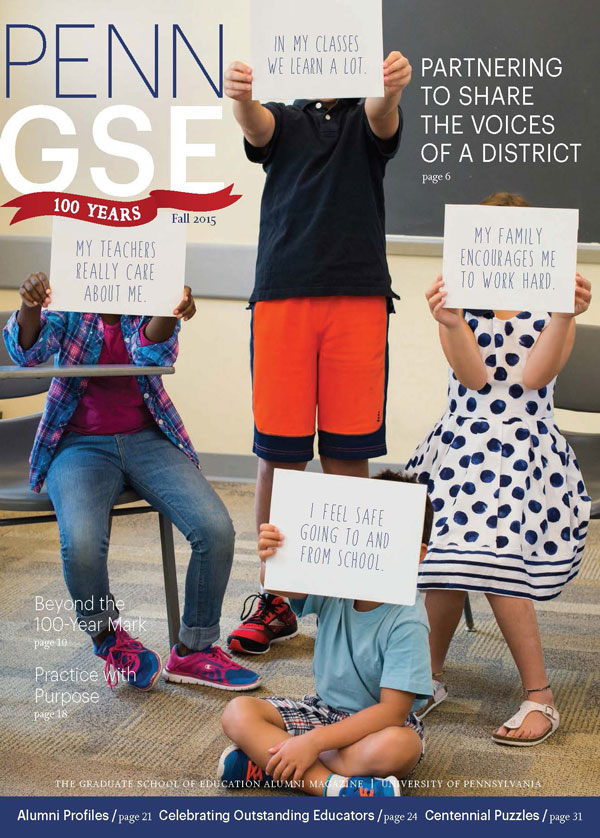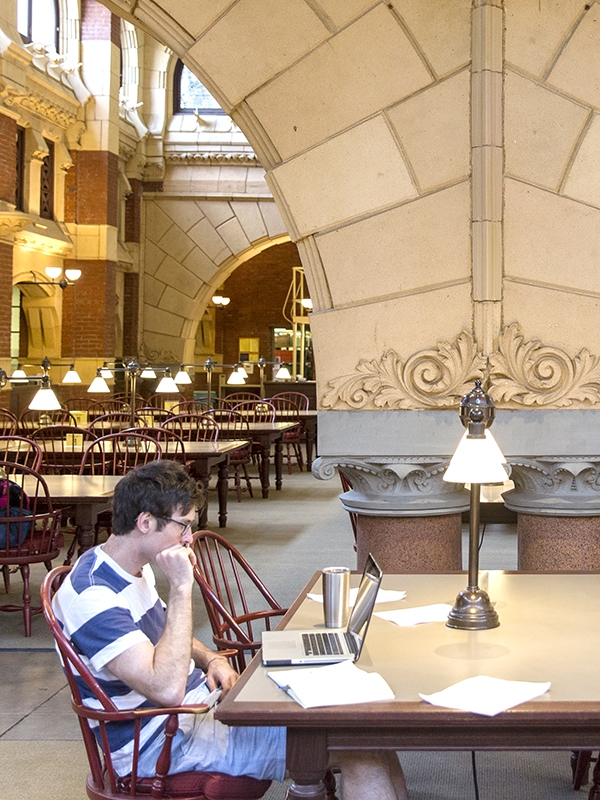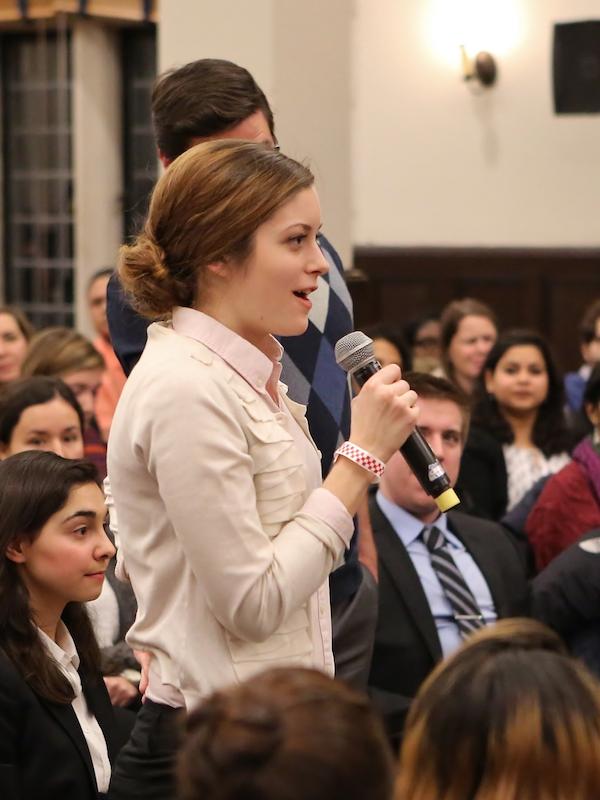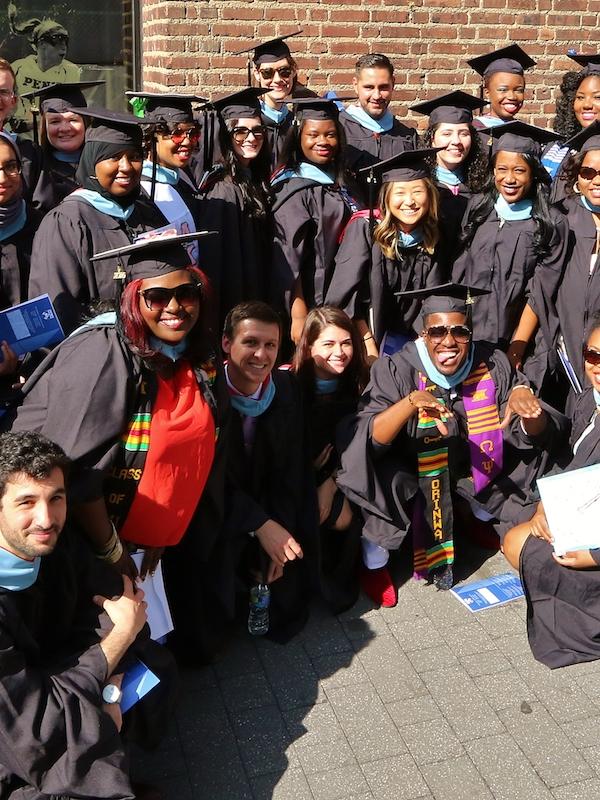Practice with purpose: The life of a Professional Counseling student
by Manasee Wagh
On the first day of her internship at the Children’s Crisis Treatment Center (CCTC) in Philadelphia, then-student Jasmine Jenkins, GED’14, GED’15, was nearly in tears, but more convinced than ever that she had found her vocation.

For twenty hours a week during her second year at Penn GSE, Jenkins counseled children with severe behavioral disorders, as well as their families, in CCTC’s outpatient department. Working in a purely clinical setting for the first time, she was touched by the children’s difficult and often heartbreaking stories, and resolute in her ambition to counsel children whose emotional development has been affected by trauma.
“They were so beautiful and warm and welcoming to me,” she says. “It broke my heart to learn about the circumstances they had faced. At the end of the day I called my mom and said, ‘I feel it. This is definitely what I want to do.’”
When she completed her M.Phil.Ed. in Professional Counseling this past spring,
Jenkins knew that her time in clinical practice—more than eight hundred hours—was the most influential factor in her formation as a counselor for children and families.
Practical experience is a hallmark of the School and the Professional Counseling program. According to Practice Professor Michael J. Nakkula, chair of Penn GSE’s Applied Psychology and Human Development division, the internship requirement is an integral part of how GSE prepares students to excel as counselors who understand the realities of their field. “We believe that students can best prepare for careers addressing emotional and behavioral health in schools, neighborhoods, and communities by spending a significant amount of time outside of class applying their knowledge and developing their skills in professional settings,” says Nakkula.
For Jenkins, her time at Penn GSE has offered the opportunity not only to gain in-depth field experience, but also to broaden her horizons by engaging with the University and developing new professional aspirations.
Direct Experience in the Field
A self-avowed extrovert, Jenkins is in her element when interacting and taking action. By week three of her internship at CCTC, she was working with a caseload of approximately fifteen children and their families to develop treatment plans, implement therapy techniques, and coordinate with resources like schools and caseworkers. “I realized that if you can’t help the parents change how they interact with their children, you can’t help the children fully,” Jenkins says.
The internship built on skills she had developed during her first year at GSE as a student in Counseling and Mental Health Services, an M.S.Ed. program that prepares students to enter the Professional Counseling program. For her required practicum she worked eight to ten hours a week at Stepping Stones, a long-term partial hospitalization program for children who have experienced trauma, mental health issues, and behavioral challenges.
Jenkins’s caring manner and clinical skills made her a hit, according to Zelice Brown Roache, GED’00, Jenkins’s practicum site supervisor and assistant director of the program at the time. “She was a natural with the children. She was enthusiastic and worked very hard,” says Roache. “The kids hated to see her leave. She really connected with them, sharing mutual interests, like basketball and dance, to develop a therapeutic bond with them. That foundation helped them to get better during the recovery-based therapy.”
While at Stepping Stones, Jenkins learned how to be a clinical professional. She wrote treatment plans and clinical progress notes for every individual session, held group therapy sessions, participated in meetings with families and outside providers, and learned crisis interventions.
She also learned the painful side of having your heart in your work. “I’m energized by being around other people and I love interacting with children,” she says. “It was so hard to leave all of the children I had connected with personally. Saying goodbye and knowing I would never see them again because our relationship was solely clinical was very difficult for me.”
Broadening Horizons
Attracted to GSE by the opportunity for field experience through the practicum and internship, Jenkins found an additional outlet for her practical skills by becoming a leader in the University community. As a graduate associate in Rodin College House, she served as a resident staff member available around the clock as a friend, mentor, and advisor to undergraduates. Working with other graduate associates, she spearheaded a mental health initiative, #rodinCARES, raising undergraduates’ awareness of resources for emotional support and offering them a safe space at a series of events.
“We tried to encourage them to find support for personal challenges without fearing negative societal connotations about mental illnesses,” Jenkins says.
Jenkins also broadened her horizons through her studies at GSE. Initially interested only in becoming a licensed professional counselor, not pursuing a future in teaching or research, she encountered professors whose mentorship opened her mind to a different path than the one she first envisioned for herself.
“I found a passion for working with children, and that made me want to develop my own research to help underprivileged populations,” Jenkins says. “Today I’m particularly interested in research to help minority children get out of what is called the ‘school-to-prison pipeline,’ a nationwide trend in which students end up expelled, suspended, or arrested for minor offenses, without the support to improve their behavior. It upsets me that minorities are disproportionately incarcerated, because it negatively affects their mental health.”
At Penn GSE, Jenkins drew inspiration from Lecturer Christina Washington and Senior Lecturer Marsha Richardson, both of whom encouraged her to aspire to teach as well as do clinical work, and Professor Howard Stevenson, whom she credits with influencing her increased interest in research.
In the Professional Counseling program, Jenkins worked as a research assistant to
Dr. Stevenson as he expanded implementation of his PLAAY (Preventing Long-term
Anger and Aggression in Youth) curriculum for children in Philadelphia schools. The curriculum is designed to teach students techniques for managing the stress induced by racial tensions and other conflicts. Visiting a school with him once a week, Jenkins helped Stevenson gather evidence of the curriculum’s impact. By teaching the children stress management techniques through specially devised role-playing and athletic activities, Jenkins saw firsthand that the research-based approach improved the children’s ability to manage stress.
“That’s when I realized I wanted research to be a significant part of my career,” she says.
Jenkins’s classmate Cheyenne Anthony, GED’14, GED’15, also formulated new ambitions at GSE. During her internship at Girard Academic Music Program, a public magnet school that offers both musical and academic instruction, she incorporated music into her therapy techniques. She now plans to conduct her own ethnographic research in music psychology and prepare for a doctoral program.
“I want to understand what artists experience psychologically while they develop as professionals,” she says. “GSE’s creative and innovative environment gave me the experience and confidence to pursue a nontraditional career.”
Jenkins is now enrolled at the University of Georgia, where she has embarked on a four-year Ph.D. program in counseling psychology. This will prepare her to emulate her professors who have multifaceted careers as teachers, researchers, and clinical psychologists. Jenkins also hopes to hone her Spanish skills in the program so that she can communicate effectively when counseling Spanish-speaking families.
“I want to positively transform the lives of children and families as much as possible,” Jenkins says. Her clear brown eyes, sunny smile, and bright “Keep Hope Alive” cell phone banner all speak to her faith in working for good no matter what hardships arise.
“I believe in helping people find hope,” she says. “Without hope, there can be no progress.”
This article originally appeared in the Fall 2015 issue of The Penn GSE Magazine.





